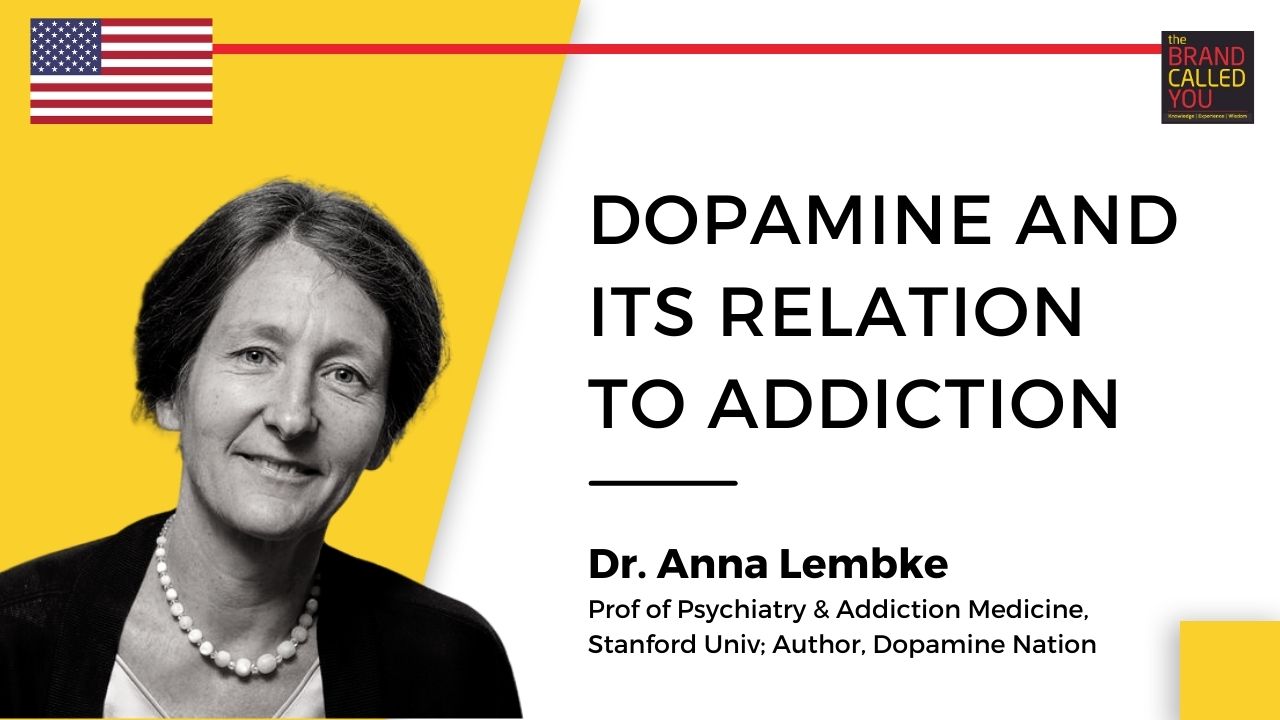Dr. Anna Lembke, Prof of Psychiatry & Addiction Medicine, Stanford Univ; Author, Dopamine Nation
- She is a professor of Psychiatry and Addiction Medicine at Stanford University.
- She is the author of the book Dopamine Nation.
Podcast
Overview
In an era where screens flicker with endless distractions, where instant gratification is just a swipe away, and where our brains swim in a sea of dopamine, it’s time to confront the hidden dilemma lurking within our pleasure-seeking minds. Welcome to the world of dopamine, the chemical allure that captivates us, entices us and ensnares us in a web of addictive behaviors. Today we talk to Dr. Anna Lembke to know more about mental health issues and how we can overcome them.
About Dr. Anna Lembke
- She is a professor of Psychiatry and Addiction Medicine at Stanford University.
- She is the author of the book Dopamine Nation.
- She also appeared in the Netflix documentary The Social Dilemma.
- She describes herself as a wanderer and is very passionate about the science behind addiction and helping people.
02:56- What inspired you to write the book?
- The reason I wrote the book was that I was noticing an increasing number of people coming to me for help with anxiety and depression.
- I was seeing the people who had loving families, great social networks, and everything going well but still, they were suffering.
- I now call it the Plenty Paradox which implies that the more we are getting, the more empty we are feeling because our brains have not evolved this much.
06:16- What is dopamine fasting and what are its benefits?
- Essentially, dopamine fasting means cutting out the drug of our choice for long enough so that our brains can down-regulate dopamine production.
- When we do things that are highly reinforcing, our brains produce more dopamine temporarily.
- One of the natural forces in our brain is to restore dopamine production to the baseline and even below that sometimes when we experience anxiety or depression, etc.
- If we engage in doping long enough repeatedly then we get stuck below normal production of dopamine. So then we have to cut the drug of our choice for long enough so that it signals our brains to start making more dopamine again.
13:50- How can individuals recognize and break addictive patterns?
- We talk about the three C’s when it comes to addiction – Control, Compulsion, and Consequences.
- Control means we tried to cut back or avoid the drug but could not. Then compulsion is like a mental obsession where we just have to have it. Finally, consequences are what we are doing to our bodies and what we are doing when we are intoxicated.
- What all this does is we get into a lot of habits that are not good for us, and we know they are not good for us, but it is very hard to break out of them.
CONNECT WITH US:
Enjoy this podcast?
If you learned new insights about the importance of laying down clear processes, subscribe and share it with friends!
Love to give us 5 stars? ⭐⭐⭐⭐⭐ If you do, we’d love a review from you. Help us reach more people to keep them in the know as we talk to leaders, high achievers, and thought leaders from diverse backgrounds and nationalities. Excellence can come
from anywhere; stay in the know, and hear from emergent high achievers and gurus.
Stay updated with what’s shaping the world today through the latest The Brand Called You Podcast episode. Follow us on iTunes, Spotify, and Anchor.fm.
You can find us at:
Website: www.tbcy.in
Instagram: http://bit.ly/3HO7N06
Facebook:http://bit.ly/3YzJOaD
Twitter: http://bit.ly/3wMBOXK
LinkedIn: https://www.linkedin.com/company/tbcy/
YouTube: http://bit.ly/3jmBqfq
Chingari: https://chingari.io/tbcypodcast
Josh: http://bit.ly/3WWP0nB
Thanks for listening!
Profile
- She is a professor of Psychiatry and Addiction Medicine at Stanford University.
- She is the author of the book Dopamine Nation.
- She also appeared in the Netflix documentary The Social Dilemma.
- She describes herself as a wanderer and is very passionate about the science behind addiction and helping people.


